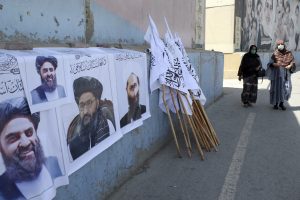The Taliban promised an “inclusive” government. In his first press conference in Kabul on August 17, Taliban spokesman Zabihullah Mujahid said that after consultations “a strong Islamic and inclusive government” would be announced.
Of course, the definition of “inclusive” is a matter of perspective. When Tajik President Emomali Rahmon announced his government would only recognize an “inclusive” Afghan government under the Taliban, he made clear his definition was ethnic-based. For many in the West, an “inclusive” government would have to include women and minorities.
On September 7, the Taliban finally announced an acting government with a pledge to name permanent leadership soon. As BBC journalist Sana Safi remarked on Twitter: “All men. All mullahs. All middle aged.” Few should be legitimately surprised at the composition. The ranking and positioning will invoke tea-leaf reading regarding status and power.
The Taliban government’s head of state, officially prime minister, will be Mullah Hassan Akhund, a lesser-known Taliban leader from Kandahar. Reports ahead of the formal announcement suggested that Akhund was a compromise candidate. He’s said to have been a founding member of the group and for the last 20 years has headed its leadership council. He’s seen as more of a religious leader than a military one and close to the Taliban’s supreme leader, Hibatullah Akhundzada.
Under Akhund, Mullah Baradar will be first deputy. Baradar is internationally known for heading the Taliban’s political office in Qatar since his release from a Pakistani prison in 2018. He’s been one of the primary faces of the Taliban’s negotiation efforts. It was Baradar who signed the Doha agreement with the United States, which paved the way for the U.S. withdrawal. Baradar was a much-hyped candidate for the top spot in the Taliban’s government.
Mawlawi Abdul Salam Hanafi is set to be Akhund’s second deputy. An ethnic Uzbek, Hanafi looks to be one of the few non-Pashtuns in the Taliban government. He has been a central member of the Taliban’s Qatar-based negotiation team and served in the previous Taliban government as a deputy minister. A 2019 article described him as the Taliban’s “hidden moderate.”
Mullah Mohammad Yaqoub is slated for the minister of defense post. Yaqoub is the eldest son of the late Mullah Omar, the Taliban’s founder. After news of Omar’s 2013 death became public in 2015, Yaqoub reportedly opposed the ascension of Akhtar Mansour to the top of the group. Mansour was killed in a 2016 drone strike and replaced at the top of the Taliban hierarchy by Akhundzada, with Baradar and Yaqoub as his deputies.
Sirajuddin Haqqani will be minister of the interior. Although Haqqani has been a high ranking Taliban leader, he’s also head of the Haqqani Network — which has its own notorious reputation. While the United States never designated the Taliban a terrorist organization (ostensibly to keep open an avenue for talks), Haqqani was designated a terrorist by the United States in 2008 and the group blacklisted in 2012. (This was arguably a splitting of hairs, as the Taliban and the Haqqani Network are not entirely separate organizations).
Mawlawi Amir Khan Muttaqi was given the foreign ministry post, with Sher Mohammad Abbas Stanikzai appointed his deputy. Muttaqi was a part of the Taliban’s Qatar-based political office and held positions in the previous Taliban government in the 1990s. Stanikzai was deputy head, under Baradar, of the political office, although he headed its opening in 2012.
The list on appointments goes on, but the above gives a sense of the Taliban’s version of inclusivity. On Twitter, Crisis Group consultant Ibraheem Bahiss commented, “As far as I can tell, all 33 are Taliban members with only 2 Tajiks and 1 Uzbek. The rest are Pashtuns.” Bahiss continued: “Don’t know which definition of ‘inclusive’ this meets…”
There are no women in the Taliban’s acting government.
Clearly, the definition of “inclusive” for the Taliban is extremely narrow, with space for token representation of minorities via trusted figures, and no serious consideration of including women. The dominant feature very well may be a government inclusive of factions within the Taliban. Although the Taliban are spoken of as one unified group, that’s usually in direct contrast to the incredibly fractured mujahideen alliance that booted the Soviets out of Afghanistan and then fell into a devastating civil war amongst themselves soon after. The years after Mullah Omar’s death, and the delayed announcement of it, were marked by reports of factionalism within the Taliban. This perhaps explains why the acting prime ministership went to a lesser-known figure instead of the jet-setting Taliban star negotiator Baradar or any of a number of long-time Taliban senior leaders.

































